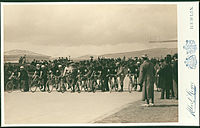
The men's points race in cycling at the 2004 Summer Olympics consisted of a 160 lap points race with 16 sprints where points were awarded. The event was held on 24 August 2004 at the Athens Olympic Velodrome. There were 23 competitors from 23 nations, with each nation limited to one cyclist in the event. The event was won by Mikhail Ignatiev of Russia, the nation's first victory in the men's points race. Spain's Joan Llaneras, the defending champion, took silver; he was the first and only person to win multiple medals in the relatively short-lived points race, and ended with three medals after another gold in 2008. Guido Fulst of Germany took bronze, the first medal in the event for that nation since 1900.
The men's track time trial in Cycling at the 2004 Summer Olympics was a time trial race in which each of the 17 cyclists from 13 nations attempted to set the fastest time for four laps of the track. Nations were limited to two cyclists each. The event was won by Chris Hoy of Great Britain, the nation's second consecutive victory in the men's track time trial. Arnaud Tournant of France earned silver after a disappointing fifth-place finish four years earlier. Stefan Nimke put Germany on the podium for the second consecutive Games with his bronze.
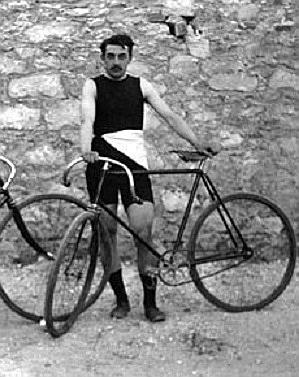
Paul Michel Pierre Adrien Masson was a French cyclist who raced at the 1896 Summer Olympics in Athens.

Felix Adolf Schmal was an Austrian fencer and racing cyclist. He was born in Dortmund and died in Salzburg. He competed at the 1896 Summer Olympics in Athens.
Frederick Keeping was a British racing cyclist. He competed at the 1896 Summer Olympics in Athens.

Cycling has been contested at every Summer Olympic Games since the birth of the modern Olympic movement at the 1896 Summer Olympics, at which a road race and five track events were held. Mountain bike racing entered the Olympic programme at the Atlanta Olympics, followed by BMX racing in 2008 and freestyle BMX in 2020. Before the 2020 Summer Olympics, all events were speed races, but the 2020 programme featured BMX freestyle for the first time.

The men's time trial was one of 5 track cycling events on the Cycling at the 1896 Summer Olympics programme. It was the fourth event on the cycling schedule and was held on 11 April. The first time trial competition was the only time that Olympic time trials were held over the distance of one-third of a kilometre; when the event returned to the programme at the 1928 Summer Olympics the distance was set at one kilometre.

The men's sprint was one of the five track cycling events on the Cycling at the 1896 Summer Olympics programme. It was held on 11 April as the second event on the schedule. It was held over the distance of 2 kilometres, or six laps of the track. The event was won by Paul Masson of France, with his teammate Léon Flameng earning bronze. Stamatios Nikolopoulos of Greece took silver

The men's 10 kilometres was one of the five track cycling races on the Cycling at the 1896 Summer Olympics programme. It was held on 11 April and comprised 30 laps of the track. The 1896 Games was the only time that the 10 kilometres track race was part of the cycling program at an Olympic Games. Six cyclists from four nations competed. The event was won by Paul Masson of France, the second of his three victories that day. His countryman Léon Flameng finished second, while Austrian Adolf Schmal was third.

The men's 100 kilometres was one of five track cycling events on the Cycling at the 1896 Summer Olympics programme. It was the first race held, on 8 April. It required cyclists to complete 300 circuits of the track. Nine cyclists from five nations competed. The event was won by Léon Flameng of France, with Georgios Kolettis of Greece coming in second.
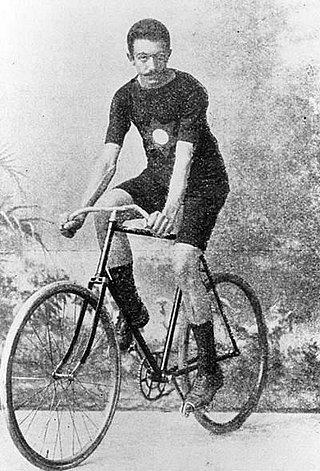
The men's road race was the only road cycling event on the Cycling at the 1896 Summer Olympics programme. The course was 87 kilometres long and the race was held on 12 April. Seven cyclists from three nations competed. The event was won by Aristidis Konstantinidis of Greece. August von Gödrich of Germany took second, while Edward Battell finished third.

The men's sprint was one of the three cycling events, all track cycling, now regarded as "Olympic" on the Cycling at the 1900 Summer Olympics programme. It was held on 11 September and 13 September. The sprint, a 2000-metre race with 1000-metre heats, was conducted in four rounds. 69 of the 72 cyclists competed in the sprint, including cyclists from all six competing nations. The event was won by Albert Taillandier of France, with his countryman Fernand Sanz in second place. John Henry Lake of the United States won the nation's first cycling medal with his bronze.

The men's 25 kilometres was one of three cycling events, all track cycling, on the Cycling at the 1900 Summer Olympics programme that were open to all amateurs, had more than one nation participating and no handicapping. It was held on 15 September. Ten cyclists competed. Four had already competed in the sprint event. The result of the race proved Louis Bastien of France to be the top long-distance cyclist present, while Lloyd Hildebrand finished in second and Auguste Daumain in third. One of the contestants, Louis Trousselier, would go on to win the 1905 Tour de France. Prizes were awarded to the top four finishers: art objects valued at 400 francs, 300 francs, 200 francs (third), and 100 francs (fourth).
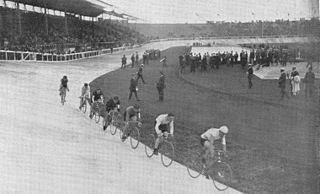
The men's 20 kilometres was one of seven track cycling events on the Cycling at the 1908 Summer Olympics programme. Its distance was the second longest of the individual event distances. Each nation could enter up to 12 cyclists.
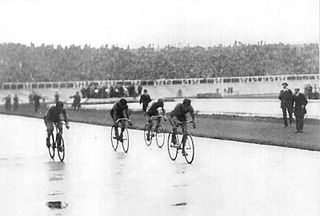
The men's 100 kilometres was one of seven track cycling events on the Cycling at the 1908 Summer Olympics programme. Its distance was the longest of the individual event distances. A challenge cup was presented by the Prince of Wales to the winner. There were 43 competitors from 11 nations. Each nation could enter up to 12 cyclists. The event was won by Charles Henry Bartlett of Great Britain, with his countryman Charles Denny finishing second. Octave Lapize earned bronze, making France the only nation to have medalists at both appearances of the 100 kilometres race.
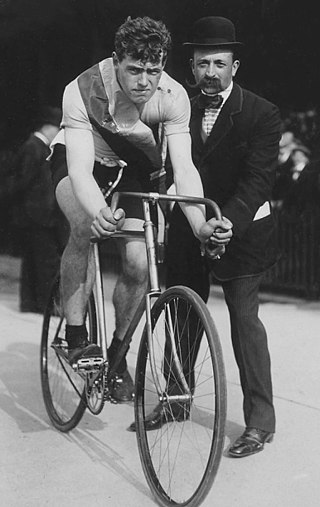
The men's 1000 metre sprint was one of seven track cycling events on the Cycling at the 1908 Summer Olympics programme. Its distance was the second shortest of the individual event distances. Each nation could enter up to 12 cyclists.

The men's individual road race at the 1956 Summer Olympics in Melbourne, Australia, was held on Friday 7 December 1956. There were 88 participants from 28 nations. Of the 88 starters 44 rode the distance to the end. The event was won by Ercole Baldini of Italy, the nation's first medal in the men's individual road race. Arnaud Geyre took silver, France's first medal since back-to-back golds in 1936 and 1948. Alan Jackson's bronze was Great Britain's first medal in the event since 1896.

The men's track time trial in Cycling at the 1992 Summer Olympics was a time trial race in which each of the thirty-two cyclists attempted to set the fastest time for four laps of the track. The race was held on Monday, July 27 at the Velòdrom d'Horta. Adler Capelli rode a bike that allowed for a single gear change, a first for an Olympic track event. There were 32 competitors from 32 nations, with each nation limited to one cyclist. The event was won by José Manuel Moreno of Spain, the nation's first medal in the men's track time trial. The United States also earned its first medal in the event, with Erin Hartwell's bronze. Shane Kelly took Australia's second consecutive silver medal in the track time trial.

The men's track time trial in Cycling at the 1996 Summer Olympics was a time trial race in which each of the twenty cyclists attempted to set the fastest time for four laps of the track. The race was held on Wednesday, July 24, 1996 at the Stone Mountain Velodrome. There were 20 competitors from 20 nations, with each nation limited to one cyclist. The event was won by Florian Rousseau of France, the nation's first victory in the men's track trial since 1968 and fourth overall. Erin Hartwell of the United States took silver, becoming the fourth man to win multiple medals in the event. Japan won its first track time trial medal with Takanobu Jumonji's bronze.

The men's points race, or “Course de Primes,” was a track cycling event at the 1900 Summer Olympics. The competition was held on 15 September 1900 at the Vélodrome de Vincennes. There were 13 competitors from 3 nations. The event was won by Enrico Brusoni of Italy, who won 5 of the laps including the last one. Karl Duill of Germany placed second, with Louis Trousselier of France third.
